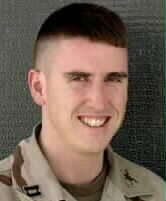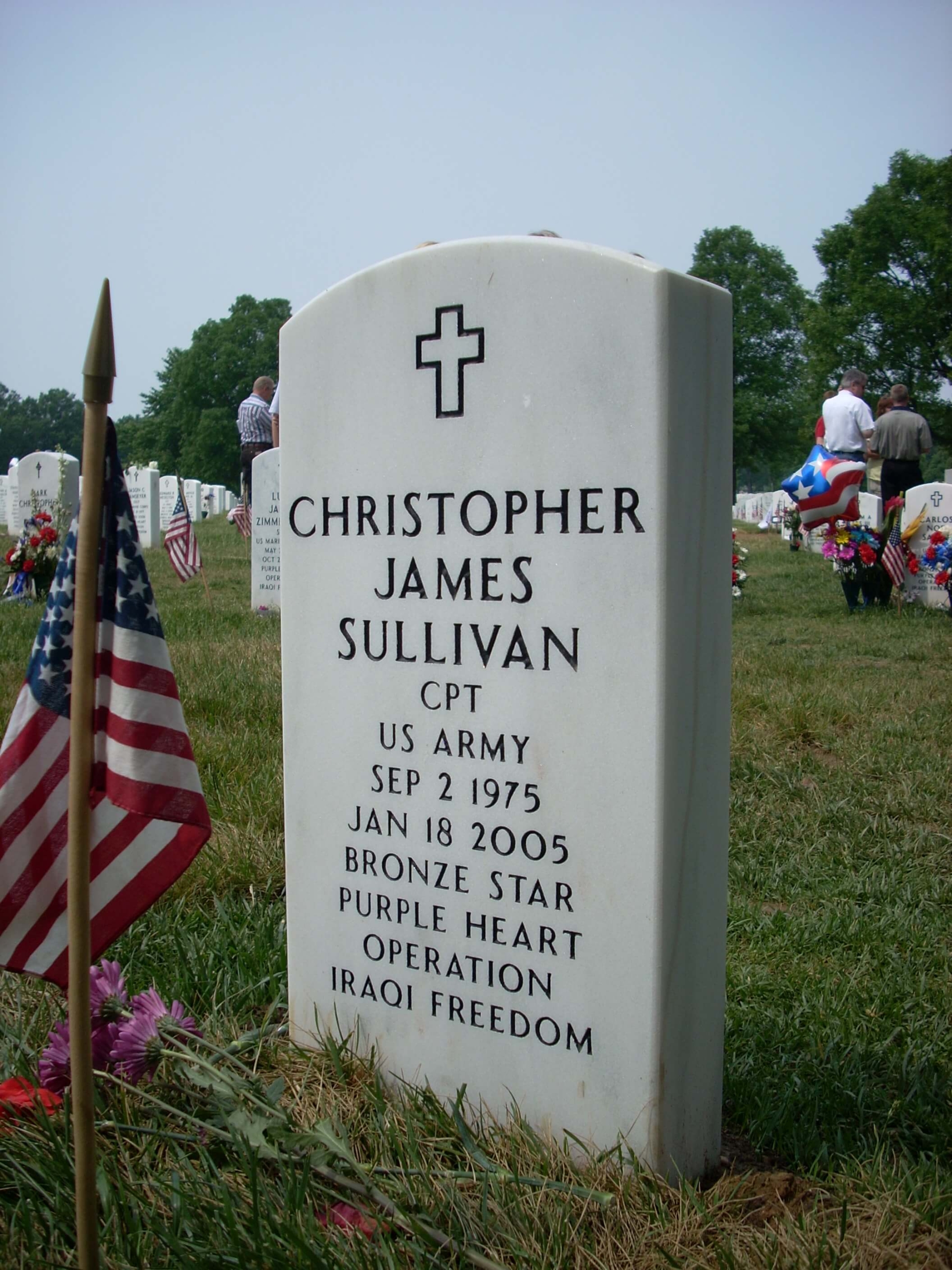NEWS RELEASE from the United States Department of Defense
No. 059-05
IMMEDIATE RELEASE
January 20, 2005
DoD Identifies Army Casualty
The Department of Defense announced today the death of a soldier who was supporting Operation Iraqi Freedom.
Captain Christopher J. Sullivan, 29, of Princeton, Massachusetts, died January 18, 2005, in Baghdad, Iraq, when an improvised explosive device detonated near his parked vehicle. Sullivan was assigned to the 1st Battalion, 5th Cavalry Regiment, 1st Cavalry Division, Fort Hood, Texas.
January 21, 2005:
Army Captain Christopher J. Sullivan was a protector, his sister said. The 29-year-old Princeton native always tried to keep his family and friends from worrying, often telling them the situation was not as grim as it appeared in Iraq, where he had been sent one January ago.
Amy Lilley, Sullivan’s sister from Scarborough, Maine, said she had heard from her brother on January 10, 2005. ”We were passing around joke e-mails,” she said.
Lilley was still trying to let the news sink in yesterday that her brother, a committed career soldier, was killed on Tuesday in Baghdad, while serving as part of Operation Iraqi Freedom.
The Department of Defense confirmed yesterday that Sullivan died when an improvised explosive device detonated near his parked vehicle.
He was scheduled to return home to his wife and son in a few weeks, the government reported.
Sullivan had been working as an armor officer, in charge of the tanks and vehicles in the field, said Maureen Ramsey, a public affairs specialist for the Defense Department.
He had entered the Army in March 1998 and just this month had taken on the responsibility of company commander, leaving a job at headquarters.
He also had served in Kosovo and Germany and in November had participated from Fallujah via satellite phone link in the Veterans Day ceremony held in Shirley.
Sullivan felt it was important to thank veterans who had preceded him and always emphasized that soldiers in Iraq were proud to serve, his family said.
Sullivan’s interest in military service started early. At age 14, he joined the Civil Air Patrol. He served in the ROTC while attending the University of Massachusetts at Lowell, where he majored in mechanical engineering. He sought to continue the family tradition of military service, following the path of his grandfather, father, and two uncles.
His parents, longtime Princeton residents James and Dorothy Sullivan, could not be reached for comment. Yesterday, they were with Sullivan’s widow, Sandy, and his 19-month-old son, David, in Fort Hood, Texas, where he was based.
Sullivan also leaves an older sister, Jennifer Orr, who lives in Epsom, New Hampshire.
Lilley said Sandy Sullivan had talked to her husband on Saturday.
”This is the worst thing that we could imagine,” she said.
17 November 2005:
On a cold and windy Veteran’s Day, more than 350 people gathered at a memorial service at the top of the hill at Krashes Fields to remember and honor the sacrifice of Princeton native Captain Christopher J. Sullivan who was killed in Iraq on January 18, 2005.
Captain Sullivan’s commanding officer, Major General Peter W. Chiarelli, 1st Cavalry Division, Fort Hood, Texas, told the gathering that Captain Sullivan’s Unit was known as the Blackjack Brigade and Sullivan had established a reputation as a stellar officer. Captain Sullivan planned and managed combat operations, one dealing with the liberation of the city of Fallujah in 2004. On his return he was assigned to a command. commander was his dream job,” said General Chiarelli. Sullivan took command of Alpha Company, establishing security in a section of Baghdad in preparation for upcoming elections.
“It’s important to me you know Chris spent a lot of time planning operations to improve the conditions of life for common Iraqis,” General Chiarelli said. “He contributed to planning the $1.9 billion infrastructure projects designed to bring life to market economy. That part of the war isn’t always reported on.
“Our soldiers gave blood, sweat and tears and some of them their lives to give Iraqis their right to freedom,” General Chiarelli said. “Chris was liked and admired by all for his sense of humor, humility and dedication to realizing his dream. Amid the tears, we all remember he was a dedicated soldier and a good and faithful friend.”
Essays on the topic of “What Freedom Means To Me” were read by Thomas Prince School students. Eighth grade student Graham Bennie told the audience that soldiers like Sullivan were fighting to maintain the freedoms Americans enjoy today, including the ability to make choices.
Seventh grader Chelsea Jackson, whose father is deployed in Iraq, said her dad has sent home photos of little boys and girls, barely dressed, who used to be afraid of living in their own country. “With the soldiers over there now, the families have the courage to stand outside in front of their run-down houses and enjoy a Coke that the soldiers have offered them,” she said. “They are also able to stand beside the road and try to sell some of what they manage to grow.
“Christopher Sullivan and my dad have both bravely stepped up to be those heroes risking their lives. What brought them both to war was the aspiration to make a difference in the Iraqi people’s lives, and to protect their own country as well,” she said.
Jackson said it was hard for her family not to be able to see her father for such long periods of time. She said she missed him at the dinner table and when he wasn’t there to give her a ride to school, and to help with her homework.
“May Christopher’s family get through this difficult time. God bless America, and God bless Christopher Sullivan,” she said.
Carrie Dolmat-Connell, choir director at the First Congregational Church, organized two benefit concerts to raise money for an educational fund for Sullivan’s young son, David. The concerts raised $17,000 and Dolmat-Connell also presented the Sullivans with a framed copy of the concert program. She cited one of her favorite quotes from Barbara Jordan, the first African-American woman to serve in Congress, “We live in a community and each of us is not an atom. What each of us does has an impact on all of us.”
As she presented the scholarship fund, Dolmat Connell said, “This conveys the depths of our community’s heart — to cry with you and to wrap our arms around you to show we care, and we still care. What is more important than the proceeds from the concerts is the outpouring of love for you for the burden of your loss. On behalf of a community, we thank you.”
“No one could ever express to you what it’s felt like to know you shared our grief,” said Dorothy Sullivan, Christopher’s mother. “He really loved life.”
Dorothy said Chris always had a little boy inside him and she was sure “he’s up there now looking down at all this and proud because he got the major general at his affair.
“Thank you for all the care you’ve given us,” she said.
Chelsea Jackson, seventh grade student at Thomas Prince School, read her essay about “What Freedom Means to Me” at the November 11, 2005, ceremony at Krashes Field.
Dorothy’s brother, and Christopher’s godfather, retired Sergeant Major Luther Davidson, said, “We’re here to celebrate all the people both living and dead who have protected our freedom. Christopher exemplified in my mind a leader.”
Davidson hoped the ceremony and memorial would help bring closure to Sullivan’s family for what has been a very long year.
“At the funeral I stood up and saluted Chris,” he said. “Today I salute all those in the Army and all those who are out defending our freedom.”
Congressman James McGovern said, “The death of Captain Christopher Sullivan reminds us how personal war is. They are owed a debt of gratitude that can’t be paid.”
Captain Sullivan epitomized a sense of duty, and a sense of patriotism, he said.
“When his son David is old enough to read this memorial he will know what a sacrifice his father made and how proud we all are of him.”
McGovern said the country should fulfill the debt to those who have sacrificed their lives and give the families the support and care they deserve.
21 April 2007:
On a day that teased of springtime, a small group of mourners gathered for a tradition-steeped ceremony at Arlington National Cemetery yesterday to honor Army Captain Christopher J. Sullivan of Princeton, Massachusetts.
It was the second funeral for Captain Sullivan, killed January 19, 2005, in Baghdad, Iraq, when a car bomb exploded next to him. A series of car and truck bombs rocked the Iraqi capital that week, just days ahead of the country’s first free election in more than 50 years.
Captain Sullivan was cremated and remembered at a service after his death in 2005. His wife, Sandra, kept the remains until this year, when she gave them to Captain Sullivan’s parents, Dorothy I. and James R. Sullivan of Princeton.
In a will drafted before his marriage, Captain Sullivan wrote that he wanted to be buried in the national cemetery and have a full military funeral, Mrs. Sullivan said in an interview yesterday.
“It was upsetting today for a while,” she said. “Actually, it was worse that he wasn’t getting his wish. (The Arlington service) opened up all the wounds again. But at least we know he got what he wanted. … There is a little closure with this.”
Captain Sullivan is the 330th military officer who served in the Iraq war to be buried in Arlington, just across the Potomac River from Washington.
Yesterday morning, a procession of nine cars — about 30 people — found its way to gravesite 8545 of the sprawling cemetery, where thousands of soldiers, public servants and President John F. Kennedy also are buried.
An Army chaplain, Captain Boguslaw A. Augustyn, presided over the ceremony. Seven members of the Army Honor Guard unfurled a flag over the brown urn that held the remains, with “Christopher J. Sullivan” etched on the side.
Another party of soldiers, with rifles, fired three shots into the air, grabbing the attention of families visiting nearby graves. They all stood still and watched in silence. From a distance, a bugler played taps as a bulldozer worked in the background in a nearby field.
The flag was presented to Captain Sullivan’s mother. An Arlington Lady, one of a group of the Army’s representatives who make sure someone attends every military funeral, presented a note of condolences to Mrs. Sullivan. It was all over in 15 minutes.
As Captain Sullivan was a commissioned officer, he was eligible for a full-honors funeral, including a three-volley salute and an Army band. But the family chose the standard ceremony instead.
U.S. Representative James P. McGovern, D-Worcester, met with Captain Sullivan’s parents yesterday morning at Arlington, but was not able to attend the graveside service.
According to Department of Defense figures released yesterday, 3,311 troops have died serving in Operation Iraqi Freedom since 2003.
Captain Sullivan enlisted in the Massachusetts Army National Guard in 1994. He served in Vilseck, Germany, where he met his wife, Sandra, and at the Kosovo-Serbia border. He was assigned to Fort Hood, Texas, in 2002.
In January 2004, Captain Sullivan was sent to Iraq, where he was an armor officer with Headquarters Company, 1st Battalion, 5th Cavalry Regiment. He helped improve the lives of ordinary Iraqis, according to Major General Peter W. Chiarelli, his commanding officer, who spoke at a Veterans Day ceremony in Princeton in 2005.
At age 29, Captain Sullivan was killed when an improvised explosive device detonated near his parked vehicle, just eight days after he had become a commander of troops.
“He loved what he was doing,” Mrs. Sullivan said yesterday. “I know he died doing what he wanted to do.”
In January 2005, more than 300 mourners squeezed into Prince of Peace Church in Princeton. He was remembered as one of the best and brightest soldiers in the Army, who served his country dutifully.
Captain Sullivan posthumously earned the Purple Heart and Bronze Star, which his wife accepted at the 2005 funeral service. His wife and their son, David, who will turn 4 in June, now live in Germany. They did not attend yesterday’s services.
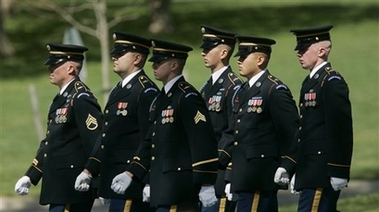
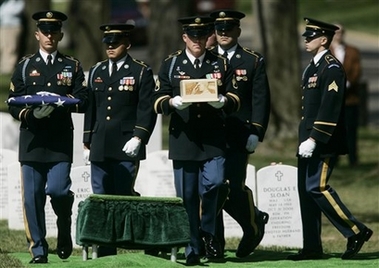
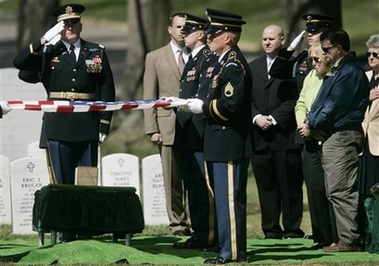
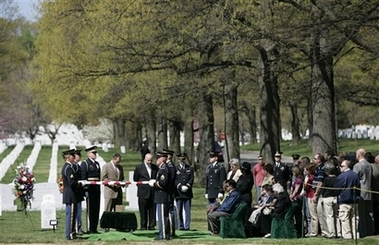
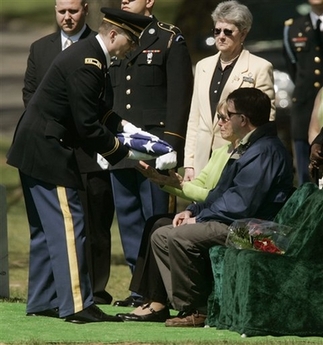
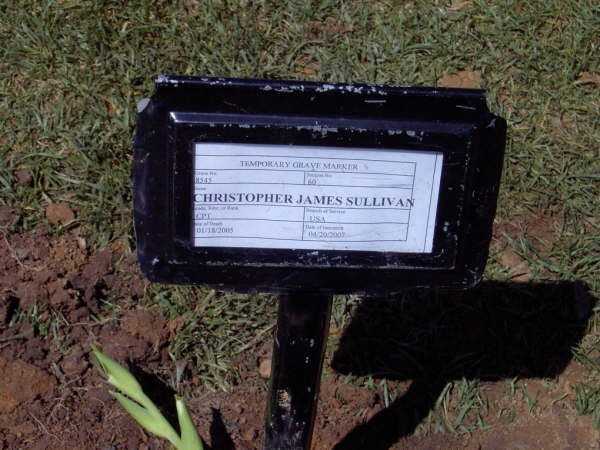
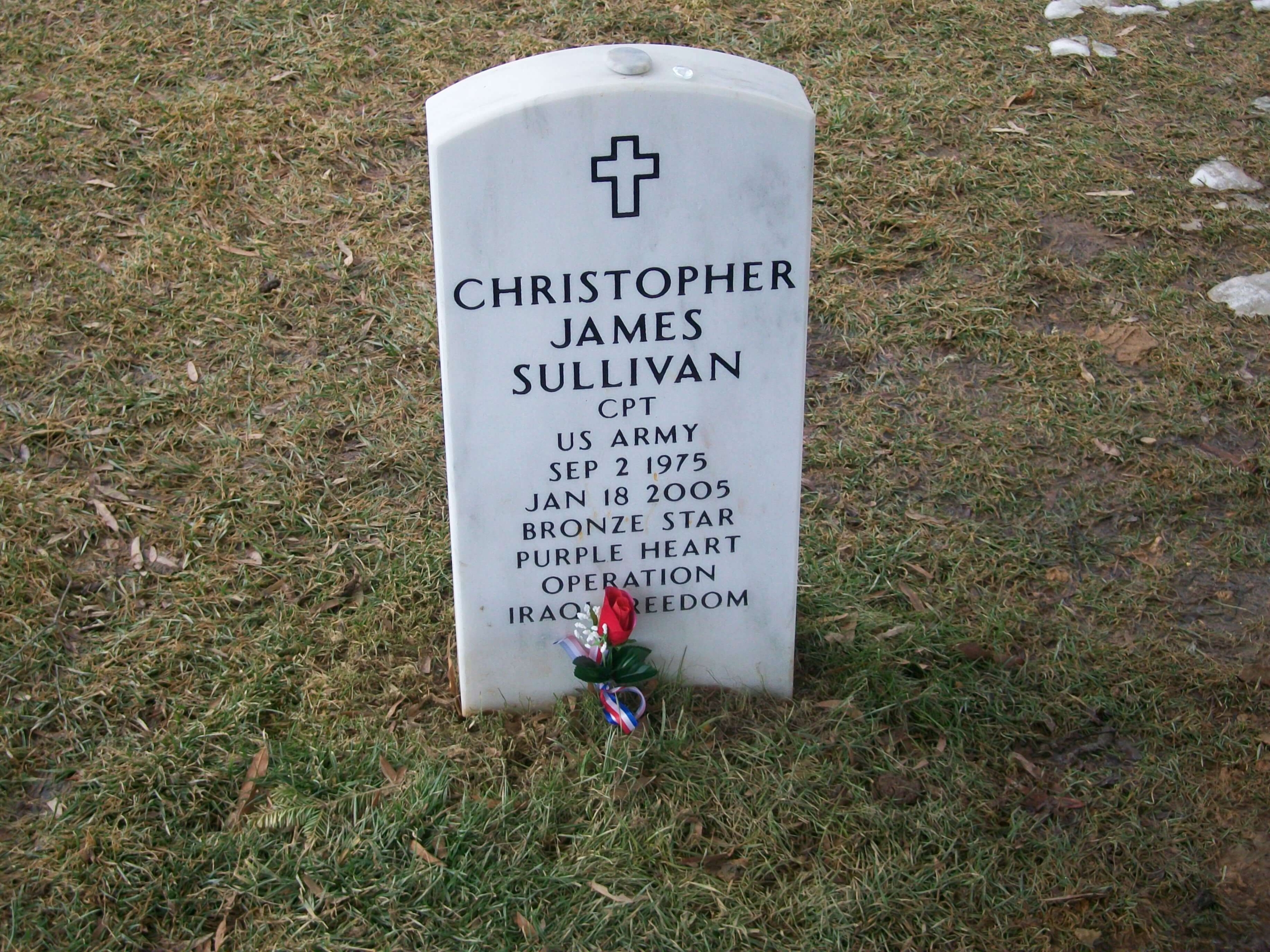
Michael Robert Patterson was born in Arlington and is the son of a former officer of the US Army. So it was no wonder that sooner or later his interests drew him to American history and especially to American military history. Many of his articles can be found on renowned portals like the New York Times, Washingtonpost or Wikipedia.
Reviewed by: Michael Howard

